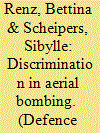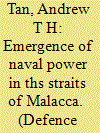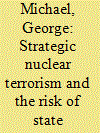| Srl | Item |
| 1 |
ID:
114604


|
|
|
|
|
| Publication |
2012.
|
| Summary/Abstract |
This article questions the notion that the norm of discrimination in air
warfare has become increasingly relevant among Western publics, policy-makers and the military in the course of the 20th century. The article offers a critique of the existing literature, which tends to
overemphasise the contrast between the largely indiscriminate use of air
power in World War II on the one hand and the greater restraint in air
strikes in armed con?icts in the second half of the 20th century on the
other. This critique will be underpinned by six short case studies discussing the uses of air power in limited con?icts from the 1920s to-today. The ?ndings indicate that the norm of discrimination had a great
salience in small wars ever since the emergence of air power
|
|
|
|
|
|
|
|
|
|
|
|
|
|
|
|
| 2 |
ID:
114607


|
|
|
|
|
| Publication |
2012.
|
| Summary/Abstract |
The emergence of naval power amongst the littoral states of the Straits
of Malacca has provided them with increasingly capable and self-reliant
naval capabilities. This naval build-up can be attributed to the growing
importance of vital sea-lines of communication due to the increased
reliance on seaborne trade and other reasons, such as the perceived need
to achieve a balance of power amongst states in the region. These
enhanced naval capabilities have the added bene?t of improving homeland security and maritime estate management, and helping to develop
security alliance relationships. Furthermore, the ability of the littoral
states to secure the Straits of Malacca has minimised the role of US and
other extra-regional navies, giving the states involved greater ?exibility
in an era of growing strategic rivalry between the US and China.
|
|
|
|
|
|
|
|
|
|
|
|
|
|
|
|
| 3 |
ID:
114605


|
|
|
|
|
| Publication |
2012.
|
| Summary/Abstract |
This article seeks to return to the question of an EU military capability
and assesses the organisations capacity for military action through an
analysis of the work ongoing in the European Defence Agency and the
prospects for practically utilising Permanent Structured Cooperation. It
highlights that the introduction of Permanent Structured Cooperation
can be seen as an opportunity for the EU Member States to ?nally
begin to address their capability gaps. Whether signi?cant change actually materialises will depend upon how such a mechanism is implemented in practice. Several factors pose major challenges: lack of
suf?cient political will to practically employ the Battlegroups, static or
declining defence budgets, unwillingness among the Member States to
pool capabilities and the lack of a fully ?edged European strategic culture. By applying the concept of strategic culture this article seeks to
analyse these complex dynamics and uncover the possibilities for bringing a new impetus behind defence cooperation within the Common
and Security Defence Policy.
|
|
|
|
|
|
|
|
|
|
|
|
|
|
|
|
| 4 |
ID:
114603


|
|
|
|
|
| Publication |
2012.
|
| Summary/Abstract |
A con?uence of macro-political forces in the United States, including
unprecedented partisanship and the familiar media bias, may be coalescing in a fateful way to produce systemic political dysfunction, pathology,
and trauma. Inescapably, the nations strategic policy and position would
suffer as a result. This analytic essay article and polemic (in the appropriate sense) presents the case that the US may have already passed its
tipping point and that national security, manifested in a world war
effort, has been put in jeopardy.
There is no a priori or empirical reason to believe that the two major
political parties in the US are always identically right and wrong, or
equally good and bad. (If that were true, it would be a probabilistic
freak.) Offered here is an ultimately, and demonstrably, non-partisan
appraisal targeting both major parties for grievously damaging Americas
strategic welfare, but via opposing routes. The comparative magnitude
of the two negative contributions is not explicitly addressed but left to
the eye of the beholder.
|
|
|
|
|
|
|
|
|
|
|
|
|
|
|
|
| 5 |
ID:
114606


|
|
|
|
|
| Publication |
2012.
|
| Summary/Abstract |
In order to mount a nuclear attack, a terrorist group would have to
surmount a daunting series of obstacles. Although the probability of
nuclear terrorism is still quite low, the potential damage could be
so catastrophic that it merits attention. Moreover, a nuclear attack
on a capital city could conceivably decapitate the central government.
The prospect of strategic nuclear terrorism could be an attractive
alternative to extremist and terrorist groups that have virtually no
hope of achieving their objectives through conventional political
means. Various extremist and terrorist subcultures have contemplated
this course of action. In order to avert the consequences of this
scenario, the system of the continuity of government should be
strengthened.
|
|
|
|
|
|
|
|
|
|
|
|
|
|
|
|